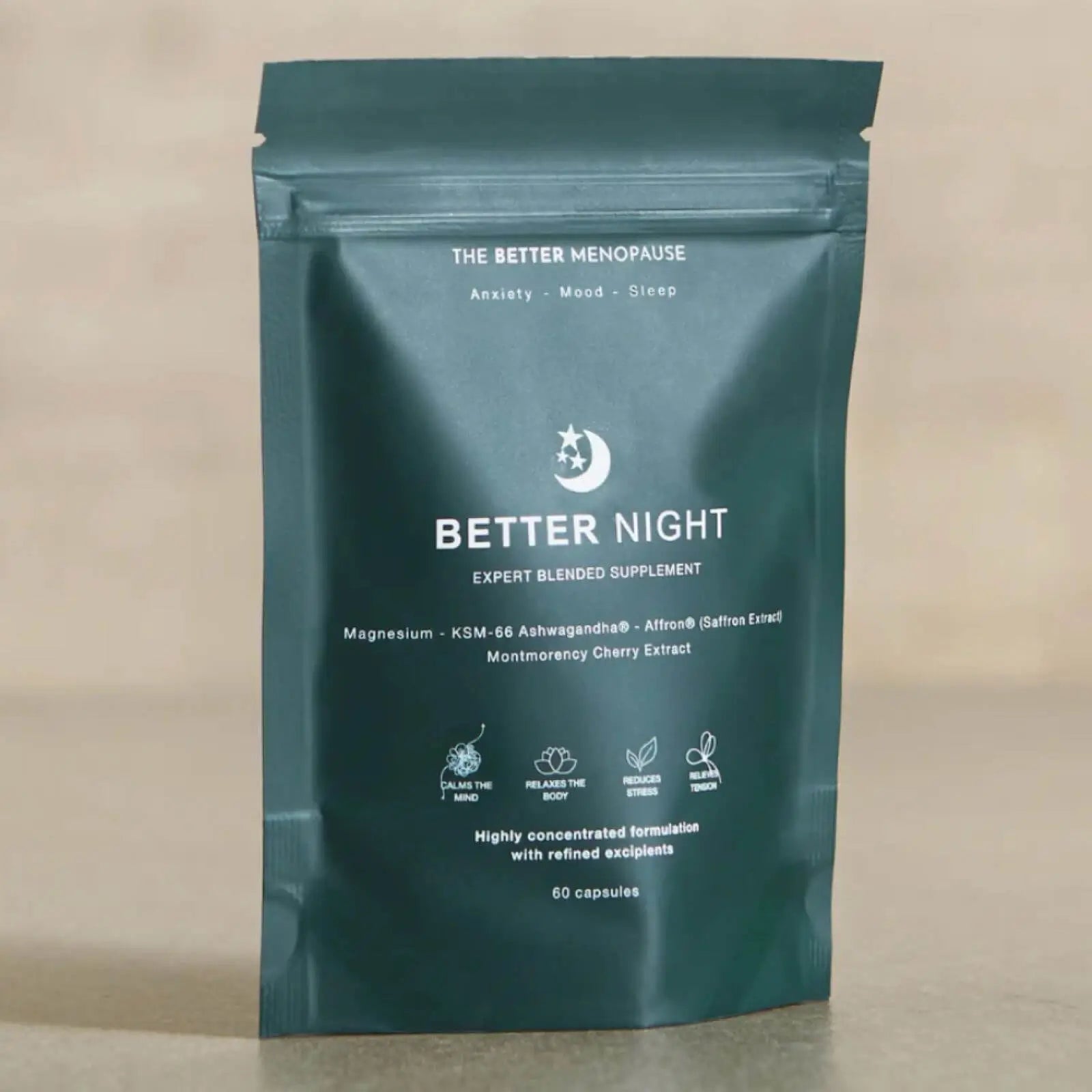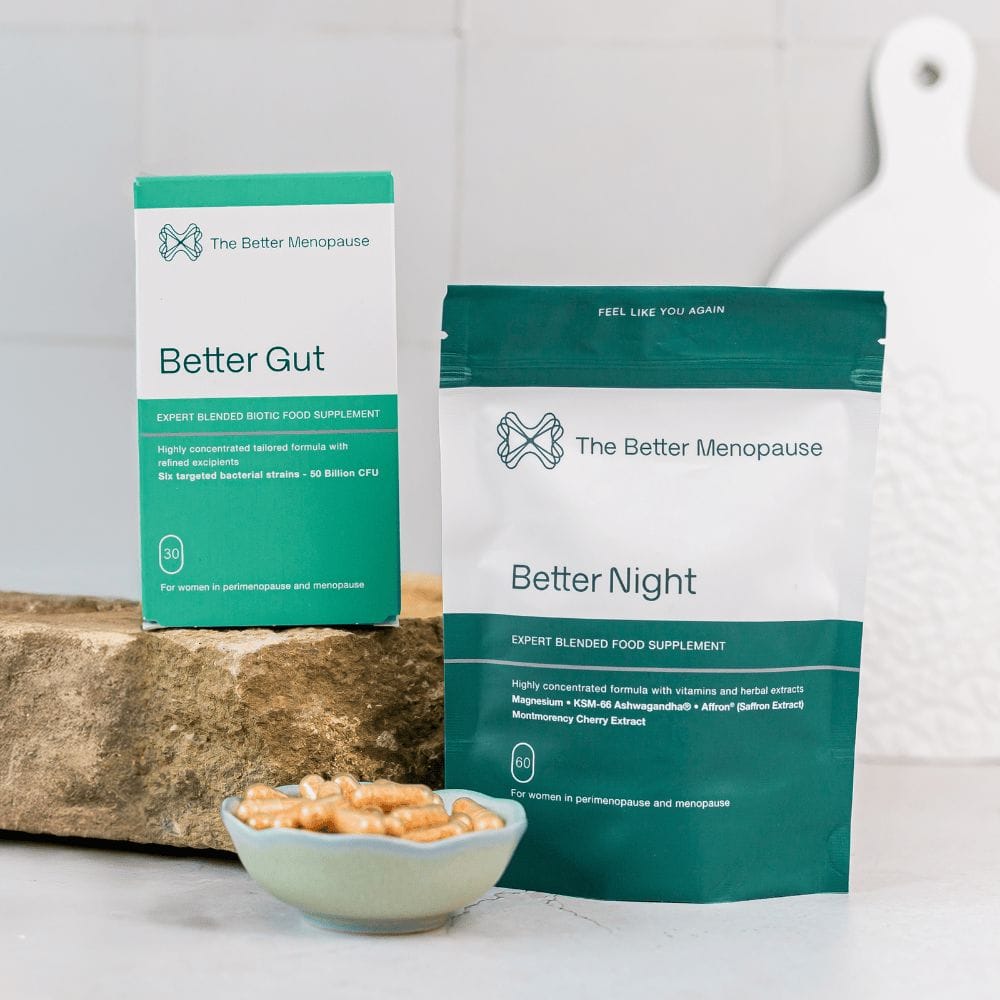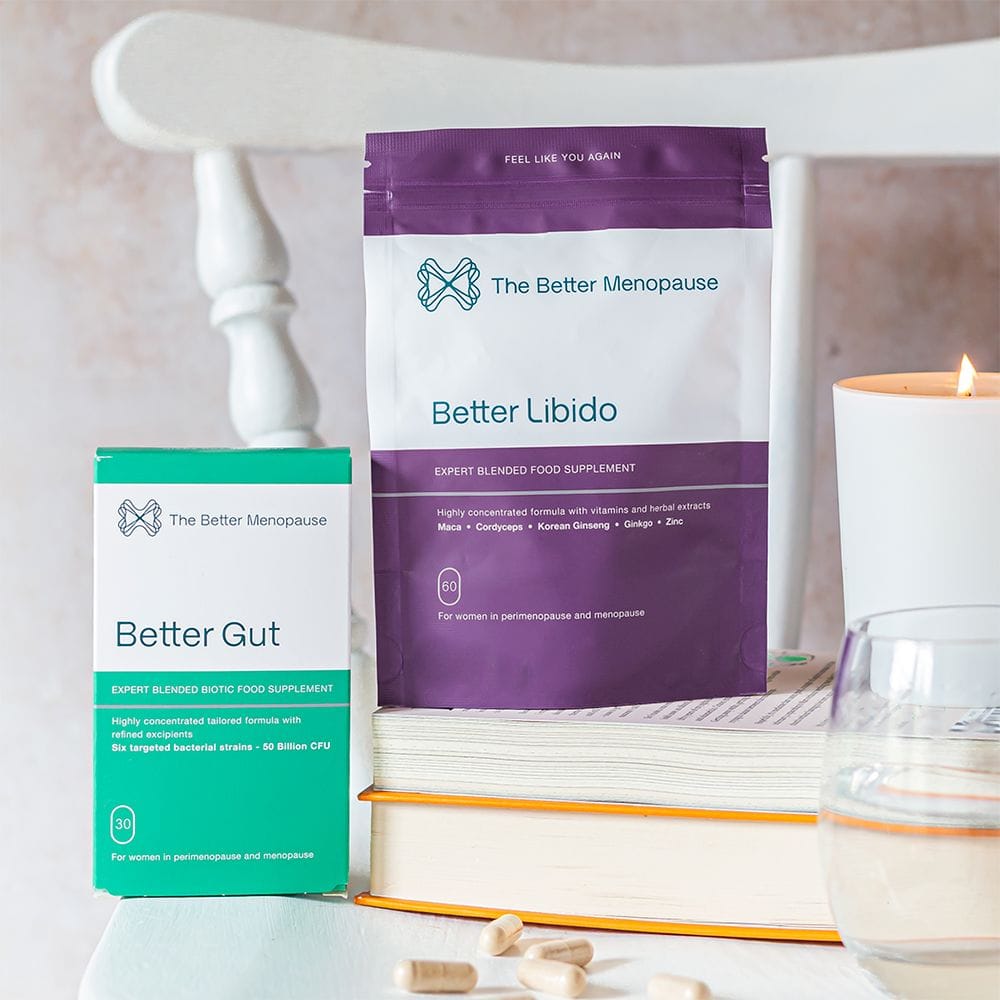
10 ways to tackle your menopause anxiety
We assess herbal remedies, supplements, lifestyle changes and other treatments that may help with anxiety during perimenopause and menopause.
Both perimenopause and menopause increase your risk of anxiety. These recurring feelings of worry, stress or fear may be partly due to changing levels of hormones such as oestrogen, which can affect the neurotransmitters involved in regulating your mood.
Other menopause symptoms, such as hot flushes and poor sleep can also contribute to anxiety, while pressures associated with this time of life can be factors too.
In this article, we’ll assess a variety of natural remedies, supplements, lifestyle tips and prescription treatments that could help with anxiety during the menopause transition, from CBT to HRT, dietary changes to regular exercise, probiotics to traditional medicine.
We’ll also consider how long your perimenopause or menopause anxiety might last.
1. Cognitive behavioural therapy (CBT)
CBT is a form of talking therapy that can help you to identify negative thought patterns and break out of them.
The UK’s National Institute for Health and Care Excellence (NICE) recommends CBT for women experiencing anxiety during perimenopause and after menopause, and there’s research to back this up.
An analysis of multiple studies involving women with menopause symptoms found that CBT reduced participants’ anxiety symptoms and improved their overall quality of life.
For help finding a CBT therapist, follow the NHS guidance.
2. Probiotic supplements
Probiotics are friendly bacteria that can help to improve the balance of your gut microbiome.
Your gut and your brain are linked by a complex system of nerve impulses, hormones and immune signals known as the gut–brain axis. Via these connections, certain types of probiotic bacteria can have a significant impact on your mental health.
Specific strains of probiotics have been shown to improve anxiety and mood swings during menopause, as well as poor sleep, which can be a contributing factor.
You can find these strains in The Better Gut probiotic supplements, along with others that target a wide range of perimenopause and menopause symptoms.
3. Regular exercise
Exercise boosts levels of stress-relieving endorphins. It can also take your mind off things that may be making you anxious, or give you a chance to process them.
A review of research by The Menopause Society found that perimenopausal and menopausal women who exercised regularly had lower rates of anxiety and depressed mood, as well as a reduced risk of several chronic diseases.
As you gradually add more exercise to your routine, try to include a combination of cardio (brisk walking, running, cycling or swimming), muscle strengthening work (weight training, bodyweight exercises or using resistance bands) and activities that help with flexibility and balance, like yoga.
4. Ashwagandha
The root of the ashwagandha plant – also known as Indian ginseng or winter cherry – has been used in traditional Ayurvedic medicine for thousands of years.
Studies suggest that ashwagandha may increase your oestrogen levels.
Trials involving women and men have found that regularly taking ashwagandha supplements can significantly reduce both anxiety scores and levels of the stress hormone cortisol.
The studies also suggest that larger doses – such as 600 milligrams (mg) a day versus 250 mg – may have greater effects.
5. Magnesium
The mineral magnesium plays an important part in your body’s response to stress. Magnesium supplements have been shown to lower cortisol levels and reduce anxiety.
In fact, one review of studies found that magnesium was as effective as conventional anti-anxiety medications for people with mild to moderate anxiety.
The review also found that a combination of magnesium and vitamin B6 reduced nervous tension and anxiety linked to pre-menstrual hormone changes.
Both magnesium and ashwagandha are key ingredients in menopause supplement Better Night. This expert blend of herbal extracts, minerals and vitamins is designed to improve anxiety, as well as low mood and sleep.
6. The Mediterranean diet
The Mediterranean diet is a healthy eating pattern made up of a wide variety of fruits and vegetables, wholegrains, nuts, and legumes like beans and pulses, as well as lots of extra virgin olive oil. It also includes some seafood and lean meat and limits ultra-processed foods.
Many of the plant foods in this kind of diet contain compounds called phytoestrogens, which may perform some of the same functions in your body as oestrogen.
The UK’s Menopause Charity says following a diet like this can help improve your mood. Studies involving postmenopausal women have also found a specific link between consuming higher amounts of extra virgin olive oil and reduced psychological symptoms including anxiety.
7. Mindfulness
Mindfulness practices, like meditation, yoga and breathing exercises, help you focus on your experiences in the moment. They teach you to be aware of your sensations, thoughts and emotions without judging them.
The same review of studies that looked at CBT (above) also analysed the impact of mindfulness on menopausal women with anxiety. Although the data was less clear-cut, mindfulness seemed to be at least as effective as CBT at reducing anxiety.
Other studies have shown that mindfulness techniques can also lead to measurable physiological changes, such as lowering your levels of the stress hormone cortisol.
8. Hormone replacement therapy (HRT)
HRT is a treatment that replaces hormones like oestrogen and progesterone, which decrease during perimenopause or after menopause. You can take HRT in pill or capsule form or through your skin using a gel or patch.
HRT can improve a range of menopause symptoms, including anxiety, although it could be several months before you see the full benefits.
If you think you have menopause symptoms and are interested in finding out more about HRT, talk to you doctor.
9. A better bedtime routine
If you have regular insomnia, you’re much more likely to develop an anxiety disorder. Anxiety can in turn lead to worse sleep, creating a vicious circle. Other menopause symptoms, such as night sweats and muscle pain or joint pain, can compound this.
Getting better sleep is easier said than done, but these changes to your bedtime routine – sometimes called your ‘sleep hygiene’ – could boost your chances:
- Get up, and go to bed, at the same time every day
- Don’t drink caffeine later in the day
- Don’t use your phone or watch TV in bed
- Keep your room dark, quiet and at a comfortable temperature
- If you get night sweats, wear light clothing and keep water and a fan by your bed
You can also read our article about herbal remedies and supplements that could improve your sleep.
10. Black cohosh
Black cohosh is a flowering plant whose roots were used in native American medicine. It has a reputation for helping with menopause symptoms but the evidence to support this is mixed.
A review published in the journal of The Menopause Society looked at seven studies testing the effects of herbal supplements in perimenopausal and menopausal women. It found that black cohosh significantly reduced anxiety in all of the studies.
However, a larger, more recent, review concluded that black cohosh did not have a notable impact on anxiety.
Part of the reason for these discrepancies might be that different black cohosh supplements contain different active ingredients, in varying amounts. Scientists don’t know exactly how black cohosh might work so more research is needed before they can say which extracts are the most effective.
Antidepressants and menopause anxiety
Doctors sometimes prescribe pharmaceutical antidepressants for menopausal women, but there’s some debate around this.
The NHS says antidepressants can help if you’ve been diagnosed with anxiety during perimenopause or menopause. However, the Menopause Charity warns that antidepressants shouldn’t be the first treatment for mood issues in these cases.
The charity says there can sometimes be a lack of awareness that these symptoms could be related to changing hormone levels and that there’s no evidence that antidepressants can actually help in these cases.
There are two main types of antidepressants: selective serotonin reuptake inhibitors (SSRIs) and serotonin-noradrenaline reuptake inhibitors (SNRIs).
If your doctor does suggest antidepressants, they’ll discuss the potential benefits and risks with you. However, initial side effects can sometimes include anxiety itself.
How long do perimenopause and menopause anxiety last?
Anxiety during menopause can be the result of a complex combination of factors. As well as changing hormone levels, you may have stresses related to your time of life, such as worries about getting older, extra family responsibilities or an increased workload. These could all impact how long your anxiety lasts.
If hormone changes are at the root of your anxiety, how long it continues could also depend on what stage of the menopause transition you are in.
During perimenopause, fluctuating hormones may cause symptoms such as anxiety. As those ups and downs subside, so could your symptoms.
Perimenopause typically lasts for around 4 to 8 years. However, that doesn’t mean your anxiety can’t improve before then. As we’ve seen in this article, there are several ways you may be able to manage and reduce your anxiety during perimenopause.
If you’re experiencing anxiety after menopause, your hormone levels are unlikely to change without treatments such as HRT. Thankfully, as with perimenopause, there are other ways to improve things, including lifestyle changes that will also boost your overall health.
Summary
Depending on what’s behind your anxiety during menopause, there are a variety of natural remedies, supplements and other treatments that may help. They include:
- cognitive behavioural therapy
- ashwagandha
- probiotic supplements
- regular exercise
- magnesium
- the Mediterranean diet
- mindfulness practices
- hormone replacement therapy
- better sleep hygiene
- black cohosh
The Better Gut probiotic supplements can help with anxiety, low mood and a whole range of other perimenopause and menopause symptoms, from hot flashes to brain fog.
For extra support with menopause anxiety, as well as low mood and poor sleep, add Better Night's expert blend of ashwagandha, magnesium and other science-backed herbal ingredients.
To find out more, visit The Better Menopause. And use the discount code WELCOME10 to get 10% off your order.





